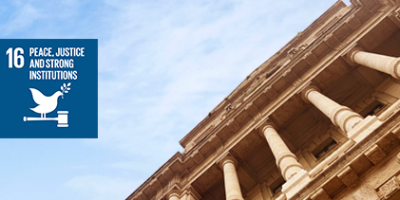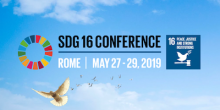
The Global Conference on SDG 16 opened on May 27, setting the stage for a series of discussions on how to achieve peaceful, just and inclusive societies as enshrined in Sustainable Development Goal (SDG) 16.
Running from May 27 – 29 and attended by a multi-stakeholder audience of government officials, heads of international organizations, academics, civil society representatives and development experts, the Conference was convened in preparation for the UN High-Level Political Forum taking place in New York in July, where the global progress of SDG 16 will be formally reviewed. The Conference is co-organized by IDLO and the UN Department of Social and Economic Affairs with the Government of Italy.
Characterized by many as the Goal that drives all others in the 2030 Agenda, the Conference seeks to deliberate the challenges and successes in realizing SDG 16 and how its aspirations, if implemented, can be truly transformational.
While the line-up of high-level speakers would share remarkable stories of innovation and transformation, IDLO Director-General Irene Khan reminded participants of the realties faced in the world today in her opening remarks, stating, “This Conference takes place against a somber backdrop of deteriorating social, political and economic conditions.”
Large scale humanitarian crises, rising inequalities, heightened social tensions that have characterized recent years present real obstacles to SDG 16 implementation. While some progress has been made, threats to stability, human rights and access to justice are constantly under attack with women, youth and marginalized groups being particularly vulnerable.
“No single actor or country can deliver the totality of the response that is required,” stated H.E Amb. Elisabetta Belloni, Secretary General at the Ministry of Foreign Affairs and International Cooperation of Italy. “We must all live up to the multilateralism that brought us together today in achieving SDG 16 and Agenda 2030.”
The focus, she added, must always be on the most vulnerable people in society, “those who are often left behind”, citing the overarching objective and heart of the 2030 Agenda.
“These are not just a disparate bundle of targets. There is a common thread and that is inclusive, effective governments that promotes justice. The chance of obtaining clean drinking water is proportionally better when there is clean government,” continued IDLO Director-General Khan, in her opening remarks.
The current situation, she added, should create strong incentives for all stakeholders to scale up their work to implement SDG 16.
Access to justice for peace and stability
During the high-level roundtable following the opening remarks specific examples were shared from Sierra Leone, Afghanistan, Kenya, Somalia and the Netherlands of how countries face both different and similar challenges in implementing SDG 16.
With a specific focus on SDG target 16.3 – to promote the rule of law at national and international levels and ensure equal access to justice for all – representatives from Sierra Leone and Somalia both emphasized equal access to justice as a prerequisite for peace and stability in their respective countries.
“I think many countries take for granted the stability they have and believe it will continue. But what is holding that stability is the independence of the judiciary where people can turn when they have complaints or grievances. If the justice is not there then people will take the law into their own hands, and a lot of other symptoms will follow,” said H.E. Hassan Haji, Minister of Justice in Somalia.
In Sierra Leone lack of access to justice fueled the country’s brutal 11-year civil war, said Hon. Dr Priscilla Schwartz, Attorney General and Minister of Justice in Sierra Leone. Now, 17 years after the end of the conflict, Attorney-General Schwartz advised other countries to widen their definition of what constitutes equal access to justice.
“Justice and institutions are connected. We are beginning to see how much we need to move away from our conception of justice as just legal systems and courtrooms and also look at mismanagement of public institutions.”
Similar to Sierra Leone, Afghanistan struggles with providing access to justice in all parts of the country, according H.E. Mohammad Farid Hamidi, Attorney-General of Afghanistan. In recent years the Attorney General’s Office in Afghanistan has managed to reopen offices in 57 districts for the first time in 18 years. They have also increased the number of female prosecutors, as one of many steps needed to provide equal access to justice particularly for women.
”SDG 16 is vital for a country like Afghanistan. We believe there is no peace and stability without justice. Why have we had decades of war? Because we have not focused on justice.”
Looking ahead to the peace process, he added that the focus on providing justice is key to build security and peace in the country.
The universality of SDG16 and Agenda 2030
Another theme that emerged was the inclusive spirit in which Agenda 2030 was adopted.
Ending the first high-level roundtable discussion, focusing on the transformative properties of SDG 16, Brazil’s Ambassador to Italy, H.E. Amb. Antonio de Aguiar Patriota, highlighted the universality of Agenda 2030. While the focus of development agendas often centers on developing countries where problems such as instability, corruption and lack of access to justice might be obvious, developed countries can also benefit.
“I would argue that there are many targets where even highly developed countries have a reason to look carefully at what happens. One such example is the situation for migrant workers, others are the issues of organized crime, illicit financial flows and corruption. We will not reach our goals unless also highly developed countries take their responsibilities.”
IDLO Director-General Irene Khan called on national “Champions of Justice” to carry progress and momentum for SDG 16 forward. “The icon for Goal 16 is the dove of peace standing on the gavel of justice. Peace, progress and sustainability are built on the foundations of justice.”
The three-day Conference will cover many issues relevant to SDG 16 including health, customary and informal justice systems, gender equality and more. The outcomes will feed into the UN High-Level Political Forum.
More information


